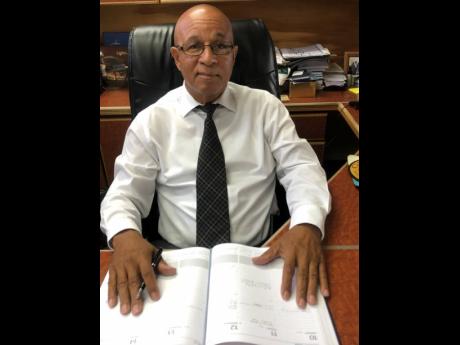The harbour master – ensuring safe navigation
In the shipping industry, the harbour master has a statutory role for the safety of harbours and port areas and for the conduct of vessels within those areas. As Jamaica celebrates 58 years of independence, we can be proud that in 1990, a Jamaican was appointed to this post for the first time.
Today, that same Jamaican, Captain Hopeton DeLisser (master mariner), continues to carry out that crucial role which includes responsibilities for the establishment, maintenance or reinstatement of navigational aids, the removal and/or marking of dangers to navigation, and the provision of adequate depths for the safe movement of vessels.
JAMAICAN AT THE HELM
Captain Hopeton DeLisser has been employed to the Port Authority of Jamaica (PAJ) over a period of 42 years, since 1978. He has served in various capacities at the Pilotage and Harbours Departments and currently occupies the positions of vice-president, harbours and port services and harbour master of Jamaica, posts he has occupied since 1990.
He attended maritime colleges in the United Kingdom and served on vessels in the British Merchant Navy early in his career, before being appointed as master on ships trading in the Caribbean and Americas.
Jamaica’s current harbour master remembers that in the 1970s, Captains Lyssa and Ostebo, both Norwegians, served as harbour master as a result of a cooperation agreement between the governments of Jamaica and Norway under the Norwegian Agency for Development Cooperation programme.
He also revealed that in the 1970s and 1980s, Captain James Martin from the International Maritime Organization (IMO) and Captain Stan Willers served in that capacity.
“I was the first Jamaican to be appointed harbour master,” Captain DeLisser recalled, while acknowledging that “the expatriates brought an international perspective and strengthened partnerships between the port and maritime industries in their countries and Jamaica”.
The harbour master noted that the non-Jamaicans who served in that role also helped in instilling necessary conformance with international standards and approaches to the management of the harbours. He added that “they ensured conformance to IMO conventions and other international requirements such as the buoyage system (System B), which applies to this region”.
NAVIGATING THE CHALLENGES
New developments in shipping have impacted the role of the harbour master, and Captain DeLisser listed vessel size, dangerous cargo, and protection of the marine environment, among others.
With regard to the size of ships, he said: “significant increase in vessel size over the years has brought about new challenges due to the need to provide adequate water depth, sufficient tugboat capacity, suitable anchorages, and getting our marine pilots familiar with the largest container and cruise ships.“ He noted also that there is the challenge of providing sufficient space and suitable areas for ships engaged in bunkering, having regard for the safety of the vessels as well as the marine environment.
Protection of the marine environment is a priority consideration for the harbour master, and this includes determining the safety and environmental impact of vessels wishing to undertake ship-to-ship transfer of cargoes and the possible impact on the harbours from ships requesting permission for hull cleaning and deballasting in the harbours.
Another challenge facing all harbour masters is the proliferation of different types of dangerous cargoes which are either being imported, in-transit or trans-shipped through our ports. Recent events in other parts of the world show the importance of transparency and special measures in dealing with such cargo.
Captain DeLisser has overall responsibility for the Marine Division of the Port Authority. This division focuses mainly on the functions relating to marine safety and harbour services, including dredging and the marine component of port development. The provision of pilotage service is also a critical function within the division. Pilotage is compulsory in Jamaica and marine pilots play a pivotal role in the safe entry and departure of vessels calling at our ports.
He served other institutions in various capacities, including as chairman of the board of the Caribbean Maritime Institute and board member of the Quarantine Authority and the Port Security Corp.
He also represented the Government of Jamaica as a member of the negotiating team on Maritime Delimitation with neighbouring states, and as country representative to the Organization of American States’ Committee on Ports. He also served as vice-chairman of the Caribbean Memorandum on Port State Control.
ROLE MODEL
Our country’s harbour master is a good role model for young Jamaicans and had this to say to those who would like to occupy his post or work in his department: “My advice is for persons to aspire to obtain the highest nautical qualifications, to be supplemented with some basic managerial training. It is also an advantage to secure adequate experience in the handling of vessels. It is also necessary to familiarise oneself with local marine conditions as well as the coastal landscape around the island.
“Emphasis should also be placed on the legislative framework governing Jamaica’s maritime sector, in addition to having sound knowledge of relevant IMO conventions and protocols.”
Jamaica’s shipping community takes this opportunity to salute our harbour master, Captain Hopeton DeLisser, and his team of dedicated experts during our country’s fifth eighth year of Independence.

